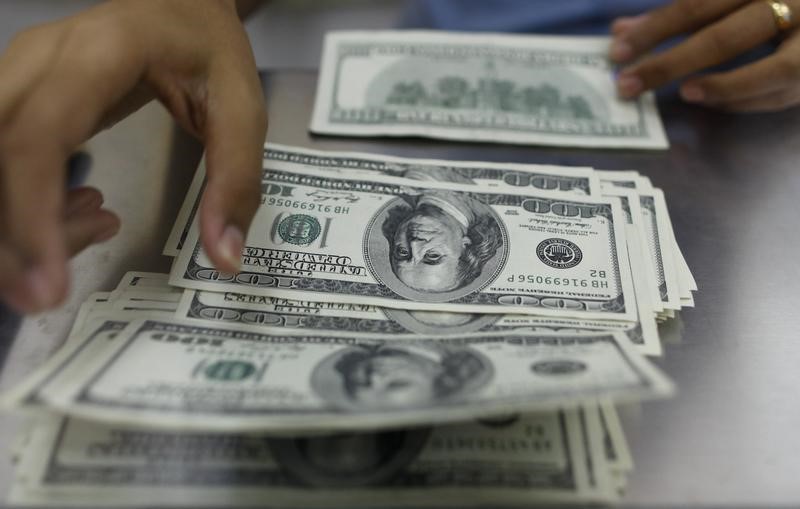Gold prices fall as geopolitical tensions ease; U.S. CPI looms
Investing.com - The U.S. dollar fell Tuesday after President Donald Trump announced a ceasefire between Israel and Iran, prompting a risk-on rally and losses for the main safe haven currency.
At 03:00 ET (08:00 GMT), the Dollar Index, which tracks the greenback against a basket of six other currencies, fell 0.3% to 97.752, but remained on course for a weekly gain.
Dollar falls on ceasefire optimism
Trump has declared that the ceasefire between Israel and Iran is now "in effect," adding that neither side should violate it.
The statement has lifted expectations that the 12-day bout of fighting, that included deadly air strikes, has now come to an end, causing the price of oil to fall sharply and boosting global sentiment.
“Markets are materially scaling back geopolitical risk as President Trump declared that a ceasefire between Iran and Israel is in place following measured retaliatory strikes on US positions in Qatar yesterday,” said analysts at ING, in a note.
“The support that had built for the dollar – albeit moderate in size – over the past few days has faltered on the back of the oil correction.”
Attention now turns to Washington, where Federal Reserve Chair Jerome Powell is due to begin two days of testimony before Congress on Tuesday.
Powell will likely be grilled on the Fed’s decision to keep rates unchanged at its latest meeting and adopt a wait-and-see attitude to future borrowing cost changes, especially after Trump called for rates to be brought down by at least "two to three points," arguing that the U.S. will pay for Powell’s "incompetence."
“Markets may treat any tweaks in Powell’s stance as an indication that Trump’s political pressure has breached the independence shield of the Fed – and that has the potential to drive substantial USD depreciation,” ING added.
Euro, sterling rise
In Europe, EUR/USD rose 0.1% to 1.1591, with the single currency helped by the drop in crude prices as the European Union is a substantial importer of oil and liquefied natural gas.
German business morale improved more than expected in June, a survey showed on Tuesday, with a particular improvement in companies’ future prospects.
The Ifo institute said its business climate index rose to 88.4 in June from 87.5 in May.
GBP/USD climbed 0.7% to 1.3596, with sterling surging after data from market researcher Kantar showed that British grocery price inflation rose to 4.7% for the four weeks to June 15, its highest level since March last year.
Kantar said the increase was driven by price rises in products such as chocolate, butter and meat.
This could make it difficult for the Bank of England to cut interest rates at its next meeting, as inflationary pressures remain elevated.
Yen recovers from sharp losses
In Asia, USD/JPY traded 0.8% lower to 144.97, with the Japanese yen recovering from sharp losses in the prior session. The yen, which typically acts as a safe haven currency, saw limited demand on Monday, even after the U.S. attacked Iran’s nuclear facilities.
Focus this week is on Tokyo inflation data for more cues on Japanese inflation, which is likely to factor into expectations for the Bank of Japan’s interest rate path.
USD/CNY slipped slightly to 7.1780, trading in a tight range in the wake of the Chinese central bank leaving its benchmark loan prime rate unchanged late last week.
